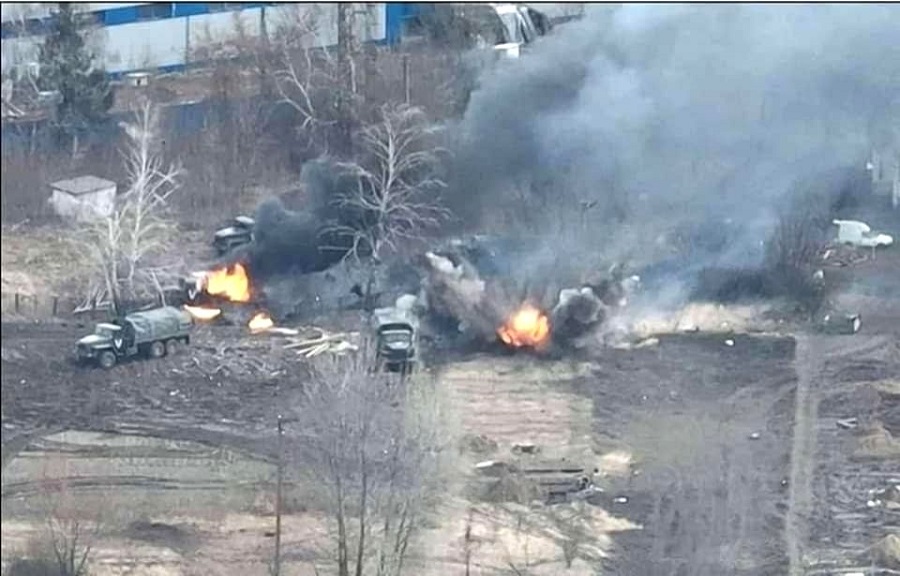

KIEV:
Russia’s ongoing war against Ukraine completed 100 days on Friday, with Moscow’s forces now in control of 20 per cent of Ukrainian territory.
On the eve of the anniversary, Ukraine’s President Volodymyr Zelensky said up to 100 of his soldiers were dying each day as they resisted Russia’s push to control the country’s eastern region, the BBC reported.
He also said that Russia now occupies a fifth of Ukraine’s territory.
Before the war, which began on February 24, Russia and Moscow-backed separatists accounted for less than 10 per cent of Ukraine’s make up.
Following the end of the battle in Mariupol last month, with Russia taking control of the Azovstal steel plant and the city, both sides have now shifted their military focus to the northeastern part of the Donetsk region, and the western part of the Luhansk region, both in Donbas.
The current military action is centred around two strategically important cities in the Luhansk region, namely Severodonetsk and Lysychansk, reports Xinhua news agency.
The Ukrainian side has confirmed that heavy fighting continued in Severodonetsk. The head of the Luhansk regional military administration Sergei Haidai recently said that Russia was gaining control of most of the city, while Ukrainian forces were still showing resistance.
During his visit to the frontline in Kharkiv region on Sunday, President Zelensky said his country’s troops were facing an extremely difficult situation.
In a Telegram post following the visit, the leader said his country would “defend its land till the very end” and “would fight and definitely win”.
Meanwhile, Russian Defence Minister Sergei Shoigu confirmed that Moscow’s “special military operation”, a term Moscow uses for the war, would continue despite Western pressure and increased Western assistance to Kiev.
While there were noticeable developments on the battlefield, the same cannot be said about the current state of the negotiation process between Russia and Ukraine.
The prospect of peace remains bleak, as talks were put on hold in April.
Russian officials said that Moscow was willing to continue diplomatic talks, despite Ukraine’s constant urge to deviate from previous agreements. After sending draft proposals to Kiev in April, Russia said the “ball was now in Ukraine’s court”.
Speaking at the World Economic Forum in Davos, Zelensky said that Russian forces must return to positions held before the start of the conflict for diplomatic talks to continue. Deputy Chairman of Russia’s Security Council Dmitry Medvedev said such conditions were “impossible in principle”.
World leaders have nonetheless continued to pursue mediation efforts. Italian Prime Minister Mario Draghi, French President Emmanuel Macron, German Chancellor Olaf Scholz have held multiple telephone conversations with Putin to discuss the Ukrainian crisis and the peace talks.
Turkey, which has expressed its desire to play a mediating role in the conflict and has already hosted a round of Russia-Ukraine talks, recently expressed readiness to host a new round of negotiations.
Nevertheless, none of the current efforts have led to a successful revival of the talks because of stark differences in the negotiation positions of both sides.
Russia has already begun strengthening its presence in southern and eastern Ukraine, including simplifying the procedures for residents in the Zaporizhzhya and Kherson regions in southern Ukraine to apply for Russian citizenship.
Meanwhile, the US and its Western allies have continued to exert pressure on Russia, ramp up sanctions, and provide military assistance to Ukraine in an attempt to end the war.
US President Joe Biden announced on Tuesday that his administration would supply Ukraine with advanced rocket systems that Kiev had requested.
The Ukrainian Defence Ministry has also announced recently that the country was receiving Harpoon anti-ship missile systems from Denmark, the UK, and the Netherlands to defend itself in the Black Sea, while other countries will also supply defence equipment in the near future.
In a bid to contain Russia even further, European Union leaders have recently agreed to ban “more than two thirds” of Russian oil imports to the bloc, as they adopted their sixth package of sanctions against Russia.
In recent telephone conversations with European leaders, Putin pointed out that the supply of weapons would further destabilise the situation and worsen the humanitarian crisis in Ukraine.
Russian Foreign Minister Sergei Lavrov has warned that the West is fighting a proxy war against Russia, using Ukraine as the battlefield.
Since the war began, 4,149 people have been killed in Ukraine and 4,945 injured, according to the UN.
Zelensky has claimed that 243 Ukrainian children have died, while and 200,000 were forcefully taken to Russia.
According to the UN, most of the civilian casualties were due to explosive weapons, shelling from heavy artillery and multiple launch rocket systems, and missile and air strikes.
Meanwhile, the Russia government has claimed that 1,351 troops killed, with 3,825 others injured.
The UN Refugee Agency estimates that more than 14 million people have fled Ukraine. Poland has taken in highest number of Ukrainian refugees – 3,544,995. While some 2.1 million Ukrainians have returned, over 8 million people remain internally displaced.
more recommended stories
BEIJING:Chinese leaders pledged on Thursday to.
LONDON:New UK Prime Minister Keir Starmer.
LONDON:Britain’s next prime minister Keir Starmer.
CANBERRA:Four pro Palestine protesters were arrested.
TOKYO:Japan on Wednesday started issuing new.
BANGALORE:Cashfree Payments and YES BANK have.
ILLINOIS (US):Six people lost their lives.
LONDON:BBC chairman Richard Sharp resigned on.
WASHINGTON:The Indian-origin stepfather of a six-year-old.
BEIJING:Astronomers have captured the first direct.